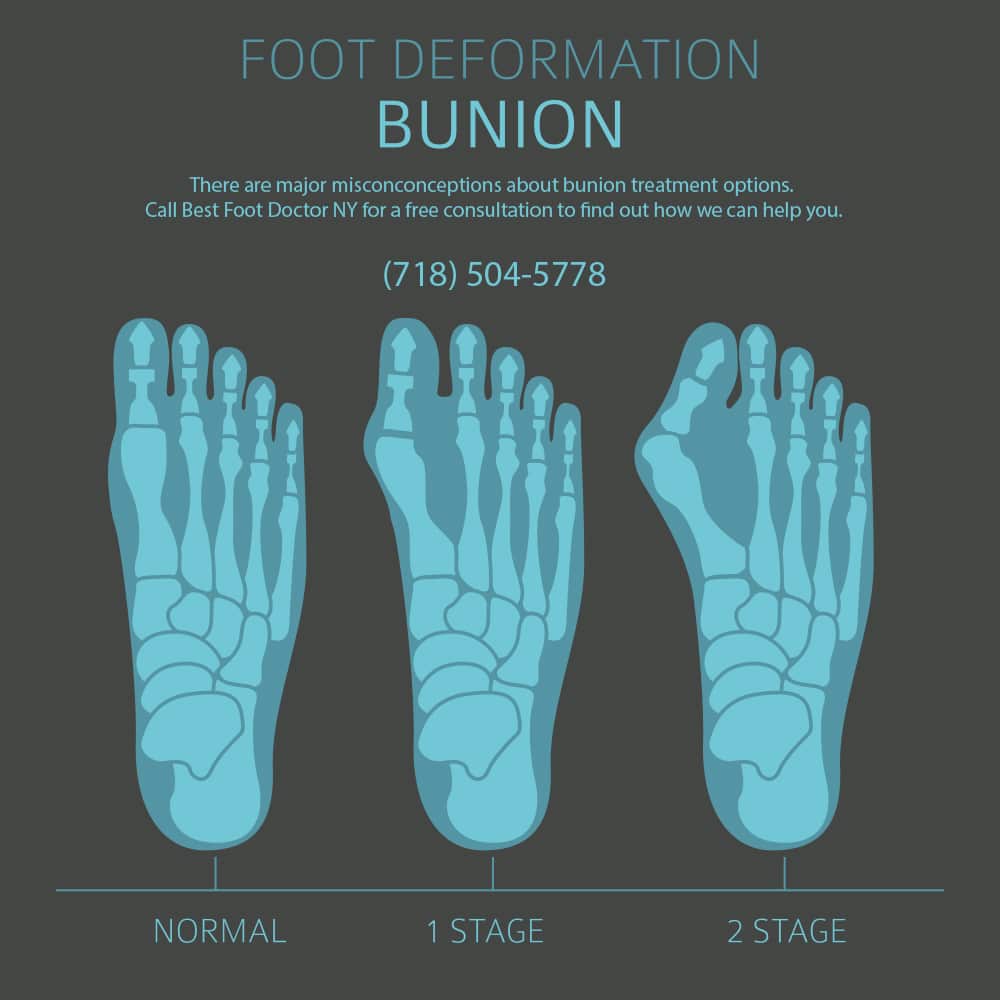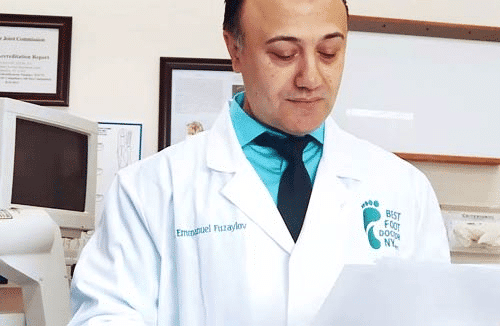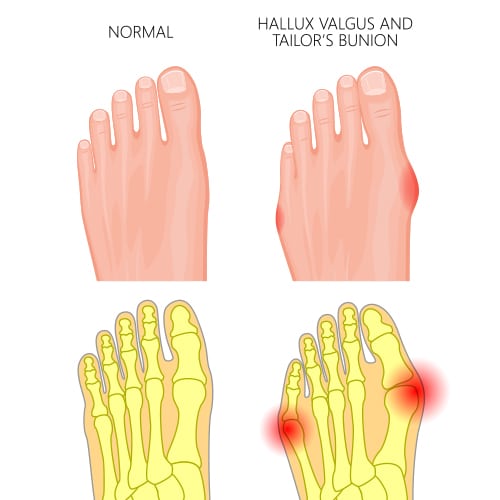Looking for the best bunion doctor in or near Bronx, New York 10463?
Best Foot Doctor NY offers bunion treatment options in your area. FREE consultation. Insurance covers most procedures. Call today: (718) 504-5778 or ask the doctor a question here.
There is a Major Misconception about Bunion Treatment Options
Many doctors advertise that they can treat your bunions with a “minimal incision”. You will hear the term “minimally-invasive surgery”. The problem is that a minimal incision only allows for the McBride procedure, which in most cases is not a procedure of choice and will cause your bunions to regrow. You don’t want that, right? Read on and learn how we do things differently hear, with your health and long-term recovery as our primary goal.
Two types of bunion treatment
- McBride – When the medial bump is just shaved off ( indicated for intermetatarsal angles 8-12 degrees).
- Austin bunionectomy – Indicated for intermetatarsal angles more than 12 degrees. The procedure that has two steps: (1) shaving the medial bump (as in McBride) and (2) the performing of an osteotomy. This is a procedure that allows the doctor to shift the head and neck of the first metatarsal toward the second metatarsal to decrease the intermeatarsal angle and restore it back to normal.
Notice that the intermetatarsal angle is the primary factor determining which procedure is recommended: McBride or Austin. The McBride procedure; without osteotomy, without screw fixation, has a total healing period of about 2 weeks. The Austin procedure requires screw fixation and the healing time is around 5 weeks. If the patient has a large intermetatarsal angle (which the majority do) and the McBride bunionectomy is done, this will cause the eventual regrowth of the bunion, excessive swelling, and pain in the operative site. With this understanding, you can begin to understand the misconception: the McBride procedure is not a procedure of choice for more than 90% of patients, rather; a classic osteotomy is the better option.
Same day bunion treatment appointments near Bronx New York 10463
Why choosing us gives you a better chance at full correction and recovery
Let’s say you heard about the minimal incision option (McBride procedure), and you found a doctor who guaranteed they could treat you like this, but in reality you needed the Austin procedure. You are putting yourself at great risk of having your bunions regrow within just a few months. On top of that, you will likely experience excessive swelling and stiffness. Most of the time patients need a classic osteotomy (the Austin procedure). The beauty is that our practice can do this procedure using the smallest devices (meaning making the incisions as small as possible).
3 Benefits of Choosing Us
- Elimination of bunion – without risk of the regrowth
- Getting a normal / functional range of motion
- Correction of the valgus position of the big toe (make it straight).
When do we recommend MIS
MIS (minimal incision surgery), where the skin incision is the size of a little hole, can only be recommended on small bunions and unfortunately, this is not indicated for the majority of cases. The majority of the cases require the classic osteotomy (Austin procedure), where on-average the incision is around one-inch long. However, our surgeon’s ability to master the classic osteotomy allows him to create a smaller-than-normal incision: about half an inch.
Our practice is called Best Foot Doctor NY, we offer a variety of minimally-invasive treatment options for bunion patients in the Bronx area.
Dr. Emmanuel Fuzalyov is highly-experienced podiatrist (foot doctor) and passionate about providing our clients with high-quality podiatric care. In particular, he’s changing the way people deal with bunions. He believes in the minimally-invasive approach whenever possible, but believes too many practices advertise this as the best option. He wants you to know that it is not always the best option, and that in many cases you your condition will not indicate this approach. The doctor wants you to know that when you come to Best Foot Doctor NY we will consult with you and provide you with the information you need to make an informed decision. Our procedures will correct the issue in the best way possible, get you back on your feet faster, and give you the best chance at not having the bunions reform.
If you and the doctor decide together that surgery is the best option, you can rest assured knowing that you’re dealing with a highly-respected podiatric surgeon, and that because of his techniques, you will be back on your feet and back to normal faster than traditional treatment approaches.
Do you have a bunion? Do you suspect that you have one? Do you have questions for the best foot doctor in the Bronx area? Ask the doctor a question right now. Or you can use the chat service located on this page.

5 Common Bunion Symptoms
- A bony bulge or bump near the joint of your great toe
- Soreness, swelling, redness near the area
- Chronic Pain (it hurts constantly)
- Acute Pain (it hurts sometimes)
- Restricted movement affecting your big toe
Need bunion treatment in 10463?
At Best Foot Doctor, with multiple locations near Bronx, New York, we can help.
Bunions not only cause ongoing discomfort while wearing shoes or walking, they often cause a noticeable deformity in the shape of your foot that can affect your self-confidence.
If you suffer from this debilitating condition, you know how painful and embarrassing the issue can be. While wearing larger shoes may offer some relief, you won’t find a more effective choice for treatment than bunion removal surgery. At Best Foot Doctor NY, the clinic of Dr. Emmanuel Fuzaylov, we can diagnose your condition and help you determine a treatment plan that is best for you.
5 Facts About Bunions
- A bunion is a medial protrusion / bump of the head of the first metatarsal.
- The deformity usually develops gradually and will cause foot discomfort and pain from shoes rubbing against the enlarged bone without orthotics.
- The severity of the bunion primarily depends on the size of that “bump” and on the angle between the first and the second metatarsal.
- Both men and women can develop them
- It appears that they are more commonly seen on women’s feet.

Why do Bunions Develop?
Bunions develop from a weakness in the bone structure of your foot. There is a strong possibility that heredity is the underlying cause. As a result, the joints have a tendency to move out of proper alignment given the instability of the bones and ligaments that form the various joints and arches in your feet. Bunions are not caused by improper footwear but are significantly aggravated by improperly fitting shoes that place an unusual degree of pressure at the joint.
As they become more severe, the joint moves out of proper alignment and eventually arthritis damages the joint space causing foot discomfort. The large toe will move sideways towards the second toe, and the foot tends to widen across the metatarsal area. This is a mechanical consequence not usually caused by footwear. However, footwear can certainly aggravate the condition and speed up the development of a more serious and significant deformity.

Bunionette – Tailor’s Bunion Deformity
A tailor’s bunion is smaller and at the base of the little toe. This condition is also known as a Bunionette. The name Tailor’s Bunion was derived from the way tailors used to sit with their legs crossed as they worked. Crossing their legs put pressure on the area known as the fifth metatarsal head, subsequently resulting in pain.
There are a few conditions which may cause the “bump” in this area:
- An overgrowth or swelling of the soft tissue covering this joint (bursitis).
- A congenitally (at birth) wide head of the fifth metatarsal bone.
- An actual bowing and/or splaying of the fifth metatarsal bone.
How are Bunions Treated?
Mild bunion deformities that require surgery usually are treated by removing a small portion of the enlarged bone at the head of the metatarsal. Our surgeon may also lengthen the tendons around the joint to realign the big toe. In more severe cases, your podiatrist may choose to perform several different procedures to realign the metatarsal. In some cases, pins, stainless steel screws, staples, wires or artificial joint implants are used so that realignment of the joint is maintained while the bone is healing.
If surgery is recommended, our specialist will discuss the surgical procedures that are best suited for your particular bunion deformity.
There are many different types of bunion procedures now available, many having been developed by podiatrists specializing in this type of surgery. The procedure selected is based on examination, X-ray findings, age and activity level of the patient; factors that can influence the final outcome. In all cases, both surgeon and patient need to work as a team for a successful and satisfactory result.
Bunion removal surgery eliminates this deformity by removing the growth and restoring a natural shape to your foot.
Based on your specific needs, our podiatric surgeons will provide you with a local anesthetic before removing the growth and a portion of your toe joint. This may also include an alignment and the insertion of small plates to correct the deformity. Recovery is only a few hours, and you should be able to walk within a day and return to normal activities in less than a week. Contact our office today to schedule a bunion surgery consultation.
Browse through the before and after photos to see for yourself how we can help you.
How can this procedure help me?
With our safe and effective bunion removal surgery you’ll see:
- The dissipation of swelling in your toes/foot
- A normal-looking shape to your foot
- The dissipation of pain while walking or wearing shoes
- The ability to bend your toes without constriction
- Confidence while walking barefoot or wearing sandals
In addition to bunion care, we offer comprehensive foot care services that include medication, orthotics, orthoscopy, and effective procedures that can provide relief and boost your self-confidence.
Enjoy the freedom of movement and freedom from discomfort while living an active lifestyle with help from the team at Best Foot Doctor NY.
We have offices in Brooklyn, Queens, and Manhattan in order to provide convenient service to the Bronx area.
Need bunion treatment in or near Bronx, New York? We can help.
We offer free consultations for patients near 10463 and surrounding neighborhoods. Send Best Foot Doctor a question here. Call: (718) 504-5778
You can also submit a question to the doctor here.
Powered By SwarmSEO
